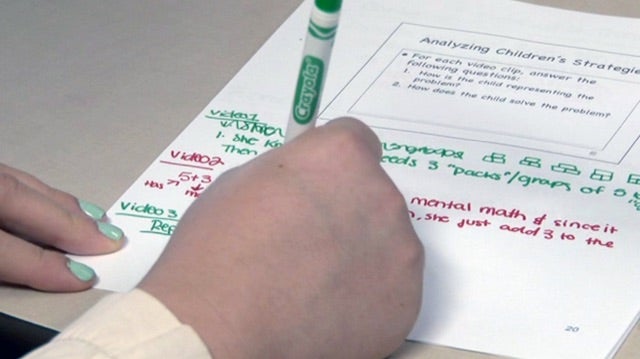Math 140 & 141
Mathematics for Elementary Education
Mathematics for Elementary Education Heading link

The MATH 140-141 sequence is designed for prospective elementary school teachers. These courses are required courses for the Urban Education program with Elementary Education Concentration in the College of Education.
Math 140 and Math 141 emphasize a problem-solving, activity-oriented approach to the study of mathematics. The first course, Math 140, integrates arithmetic and algebraic concepts. The second course, Math 141, integrates geometric and algebraic ideas with a sub-focus on statistics and probability ideas. Both courses encourage interaction between students in a cooperative learning atmosphere. Course work includes not only tests and homework but also group and independent investigations.
Math 140 and Math 141 are designed especially for people who seek to become teachers of mathematics. Teaching mathematics requires a great deal of specialized mathematical knowledge – knowledge that is different from what it takes to do well in a math course as a student yourself or to be good at other jobs that require mathematics. Thus these two courses focus on supporting prospective elementary school teachers in revisiting, refining, and extending their mathematical knowledge and making connections to teaching.
Success in these courses requires a mastery of precollegiate mathematics, including algebra. Students who do not demonstrate sufficient mathematical strength are placed into algebra courses. Transfer students who have taken math for teachers courses may be able to receive credit for Math 140 or Math 141.
To confirm your readiness to take one of the courses, we encourage you to contact the Director of the Office of Mathematics Education. You can arrange to take a practice exam that we can grade and then counsel you appropriately.
Course Descriptions Heading link
Math 140
The content of Math 140 centers around the unpacking and development of a flexible understanding of important mathematical ideas and processes within the areas of number theory (e.g., factors and multiples; even, odd, prime, composite, and square numbers; divisibility tests); place value and operations; and fractions (different meanings and representations, e.g., fractions as parts of wholes, as portions of discrete sets, as division, as points on a number line).
Math 140 students engage in problem solving and discussions that encourage the mathematical practices of explaining (e.g., exploring central features of an adequate mathematical explanation), representing (e.g., using multiple representations, making connections among representations) and questioning (e.g., meta-cognitive questioning, questioning to make sense of the strategies of other students).
Math 141 Heading link
Math 141
In Math 141 students’ work centers around the unpacking and development of flexible understanding of important mathematical ideas and processes within the areas of shape (e.g., properties of two and three dimensional shapes); congruence and similarity (e.g., transformations, proportional reasoning), measurement (e.g., area, perimeter, volume and surface area), and statistics and probability (e.g., data displays, measures of central tendency and dispersion, experimental versus theoretical probability).